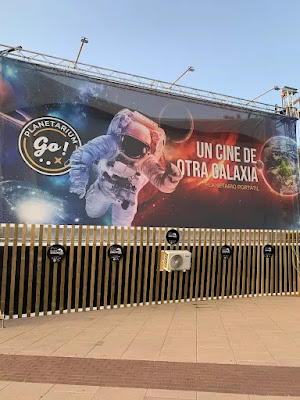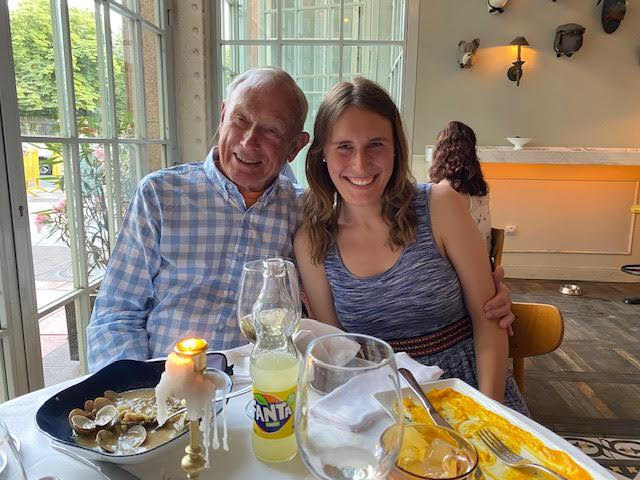Life from a 30 Degree Angle: How a Planetarium Shifted My Perspective
Hello! I am already a couple of weeks into my summer internship and I am finally posting for the first time. My time in Spain so far has been wonderful; my coworkers at my internship are friendly and helpful, I enjoy spending time with my host family, I have friends to hang out with, and I have been escaping the intense summer heat by swimming in the pool at the gym and going on excursions to the beach. However, I have taken awhile to publish here due to the writer’s block I have been struggling with. I started this blog to write about my experiences interning at ACPACYS, a nonprofit organization that helps people affected by cerebral palsy, as well as my experiences in Spain outside of my internship. However, when I sit down to write, I often worry about my posts coming across as cliche or saying the wrong thing. When I get in this mindset, I become discouraged and writing begins to feel so overwhelming that I have to step away from my keyboard. Sometimes I have ideas for blog posts, but I worry about them being too abstract or difficult to understand and I do not know how to go about expanding my ideas. Lately, I have been working on letting myself write freely while reminding myself that any ideas are good ideas during the beginning stages of the writing process, and every piece of writing has to go through the beginning stages. As I do this, I have begun to realize that my experiences at my internship and outside of my internship do not have to be completely separate, rather there are connections that I can make between them. Below is an anecdote about how a trip to a planetarium shifted my perspective:
On the way to my internship on a Friday, I passed a temporary building right across from the Córdoba train station that I hadn’t noticed before. The building had the words “Planetarium Go” painted on it, which immediately caught my attention given my fascination with outer space ever since I was ten. I texted a friend that I had met through the PRESHCO conversation partners program and we made plans to go the following day.
My interest in outer space was sparked by my fifth grade teacher who taught my class about the moon phases, how to find planets in the night sky, and light years. Before I learned about these topics, I was under the impression that I could cover the moon and planets in the night sky with my hand because Earth was much larger than any other celestial body. In fifth grade, I realized these celestial bodies seemed so small not due to their size but due to their distance from Earth. I was amazed by how something large could appear small due to being far away, which made me appreciate the depths of outer space but also overwhelmed me. Looking up at the sky produces a range of emotions for me. On one hand, I enjoy all of the twinkling lights, but on the other hand the infinite darkness and depths of the unknown make me feel small and afraid.
My visit to the Planetarium in Córdoba involved viewing a short film about outer space in a projection dome. We sat in seats that were comfortable and very reclined. However, I only felt relaxed in my seat until the movie began. The dome shape of the screen made the scene come to life and the lights created a sense of movement. As I felt the depths of outer space towering over me and rushing past me, I felt like an insignificant part of the universe suffocating from the unending darkness. Due to the position of my seat, I couldn’t look down to experience a position of dominance over everything below me and the comfort of finity, as space ends on the ground.
At that moment, I started to think about an ACPACYS resident whose body has to be at a 30 degree angle in his wheelchair at all times, a very similar position to the one I sat in during the 20 minute movie. He is practically lying down in his wheelchair and goes about his everyday life in this position. During the movie, I realized I was getting a taste of the world from his perspective. He always looks up and sees the vastness of the world towering over him and rushing past him before he can reach for what he wants and needs. Everything appears so close even though it is far away, an illusion he cannot look away from. He sees an overwhelmingly wide range of opportunities and possibilities that appear close and easy to grasp in his mind but he is trapped in the darkness of his physical body and a society that does not help him as much as it should. Although his body may not be mobile, his mind is not paralyzed. His sense of humor is intact as is his appreciation for poetry; he spends much of his free time writing his own poetry and reciting poetry by Gandhi.
This ACPACYS resident spends most of his life without looking at the ground. When thinking about how much I look at the ground for my own safety, peace of mind, and control, I begin to wonder how it is possible to be grounded without being able to look at the ground regularly. According to the dictionary, the definition of grounded is “well balanced and sensible”. Although the resident does not have good balance and cannot feel or see the ground physically, I realized that does not mean he cannot be well rounded and wise. He is elevated from the ground and it is up to others to decide how to contribute to his perspective, which will determine how he views the sky. Do they want to be birds that approach him and invite him to soar with them, or do they want to be the distant planets and stars that rush past him and make him feel trapped in darkness? One person’s decision can make a world of difference, and I hope to be one of the birds that empowers him to soar.


Comments
Post a Comment